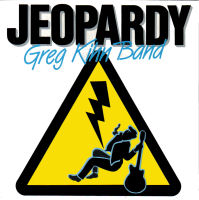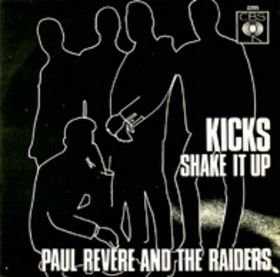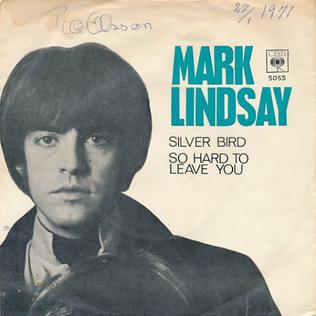Related Research Articles

Paul Revere & the Raiders were an American rock band formed in Boise, Idaho, in 1958. They saw considerable U.S. mainstream success in the second half of the 1960s and early 1970s. The band was known for including Revolutionary War-style clothes in their attire.

"I Can't Get Next to You" is a 1969 No. 1 single recorded by the Temptations and written by Norman Whitfield and Barrett Strong for the Gordy (Motown) label. The song was a No. 1 single on the Billboard Top Pop Singles chart for two weeks in 1969, from October 18 to October 25, replacing "Sugar, Sugar" by the Archies and replaced by "Suspicious Minds" by Elvis Presley. The single was also a No. 1 hit on the Billboard Top R&B Singles for five weeks, from October 4 to November 1, replacing "Oh, What a Night" by the Dells, and replaced by another Motown song, "Baby I'm For Real" by the Originals.

"Mr. Sandman" is a popular song written by Pat Ballard and published in 1954. It was first recorded in May of that year by Vaughn Monroe & His Orchestra and later that year by The Chordettes and the Four Aces. The song's lyrics convey a request to "Mr. Sandman" to "bring me a dream" – the traditional association of the folkloric figure. The pronoun used to refer to the desired dream is often changed depending on the sex of the singer or group performing the song, as the original sheet music publication, which includes male and female versions of the lyrics, intended.

Sugar, Sugar is a song written by Jeff Barry and Andy Kim. It was originally recorded by the Archies, a fictional band of studio musicians linked to the 1968–69 US Saturday morning TV cartoon The Archie Show, inspired by the Archie Comics. In the autumn of 1969 the single topped both Billboard's Hot 100 and the UK Singles Chart, ranking No. 1 for the year in both America and Britain. “Sugar, Sugar” is the most successful bubblegum pop single of all time, and is widely regarded as the apotheosis of the late-1960s/early-1970s bubblegum music genre. In mid-1970 R&B/soul singer Wilson Pickett achieved success on both the US soul and pop charts with a cover version.

"Angel of the Morning" is a popular song written by Chip Taylor, originally recorded by Evie Sands, but which first charted with a version by Merrilee Rush. The song has been covered by many artists including P. P. Arnold, Connie Eaton, Mary Mason, Guys 'n' Dolls, Melba Montgomery, Olivia Newton-John, Bettye Swann and, most recognizably, by Juice Newton.

"Broken Wings" is a 1985 song recorded by American pop rock band Mr. Mister. It was released in June 1985 as the lead single from their second album Welcome to the Real World. The song peaked at number one on the Billboard Hot 100 in December 1985, where it remained for two weeks. It was released as the band was just about to embark on a US tour opening for Tina Turner. "Broken Wings" became the first of two consecutive number ones of the band on the American charts, the other chart-topper being "Kyrie". Outside of the United States, "Broken Wings" topped the charts in Canada, peaked within the top ten of the charts in Australia, Belgium (Flanders), the Netherlands, Norway, the Republic of Ireland, Switzerland, the United Kingdom and West Germany, and the top twenty of the charts in Austria, New Zealand, Spain and Sweden.

"How Am I Supposed to Live Without You" is a song written in 1982 by Doug James and Michael Bolton. The ballad has been recorded by many artists around the world, in several languages, most notably by Bolton himself, becoming something of a modern pop standard. Instrumental versions of the song have been recorded featuring variously the piano, guitar, saxophone, pan flute, steel drum, and music box.

"No Matter What" is a song originally recorded by Badfinger for their album No Dice in 1970, written and sung by Pete Ham and produced by Mal Evans.
"If I Were a Carpenter" is a folk song written by Tim Hardin in the 1960s, and re-recorded with commercial success by various artists including Bobby Darin, The Four Tops and Johnny Cash. Hardin's own recording of the piece appeared on his 1967 album Tim Hardin 2. It was one of two songs from that release performed by Hardin at Woodstock in 1969. The song, believed by some to be about male romantic insecurity, is rumored to have been inspired by his love for actress Susan Morss, as well as the construction of Hardin's recording studio.

"Games People Play" is a song written, composed, and performed by American singer-songwriter Joe South, released in August 1968. It entered the Billboard Hot 100 in January 1969 and won the 1970 Grammy Awards for both Best Contemporary Song and the Song of the Year.

"Jeopardy" is a song released by the Greg Kihn Band, from their 1983 album Kihnspiracy. It was the band's only Top 10 hit on the Billboard Hot 100 singles chart, reaching number 2 in May 1983, and also hit number 1 on the Billboard Hot Club Dance Play chart for two weeks a month earlier. The song also reached number 63 on the UK Singles Chart, becoming the band's only charting song in the UK. The song is written in the key of D minor.

"(Your Love Keeps Lifting Me) Higher and Higher" is an R&B song written by Gary Jackson, Raynard Miner, and Carl Smith. It was recorded by Jackie Wilson for his album Higher and Higher (1967), produced by Carl Davis, and became a Top 10 pop and number one R&B hit.

"Soul Man" is a 1967 song written and composed by Isaac Hayes and David Porter, first successful as a number 2 hit single by Atlantic Records soul duo Sam & Dave, which consisted of Samuel "Sam" Moore and David "Dave" Prater. In 2019, "Soul Man" was selected for preservation in the National Recording Registry as "culturally, historically, and aesthetically significant" by the Library of Congress. It was No. 463 in "Top 500 Greatest Songs of All Time" by Rolling Stone Magazine in 2010 and No. 458 in 2004.

"Indian Reservation (The Lament of the Cherokee Reservation Indian)" is a song written by John D. Loudermilk. It was first recorded by Marvin Rainwater in 1959 and released on MGM as "The Pale Faced Indian", but that release went unnoticed. The first hit version was a 1968 recording by Don Fardon – a former member of the Sorrows – that reached number 20 on the Hot 100 in 1968 and number 3 on the UK Singles Chart in 1970.

"Kicks" is a song composed by Barry Mann and Cynthia Weil, best known as a 1966 hit for American rock band Paul Revere & the Raiders.

"No Matter What Sign You Are" is a song released for Diana Ross & the Supremes by the Motown label.

Paul Revere & the Raiders are an American rock band from Boise, Idaho. Formed in 1958, the band released their first hit single three years later, "Like, Long Hair", which reached number 38 on the U.S. Billboard Hot 100 chart. Following a few minor charting singles, including a version of "Louie Louie", the band worked with producer Terry Melcher in updating their sound, combining fast-paced, guitar-and-vocal-dominated rock and roll with an intimidating R&B flavor. The result was a string of commercially successful singles, beginning with 1965's "Steppin' Out" and continuing with "Just Like Me", which reached number 11 on the Hot 100, as well as "Kicks", "Hungry", and "Good Thing", all of which peaked inside the top 10. In addition, the band's three 1966 studio albums—Just Like Us!, Midnight Ride, and The Spirit of '67—were each certified gold in the United States.

"And the Grass Won't Pay No Mind" is a song written by Neil Diamond and recorded in 1969 on his Brother Love's Travelling Salvation Show LP. It was also featured on his live LP Hot August Night. Diamond's original became a minor hit in Australia before the song became a U.S. and Canadian hit for Mark Lindsay in the fall of 1970.

"Silver Bird" is a song written by Kenny Young and Artie Butler and recorded by Mark Lindsay, in his solo career after Paul Revere and the Raiders.

"Birds of a Feather" is a 1968 song by Joe South from his first LP, Introspect. It initially became a minor hit in the U.S., reaching #106 on Billboard.
References
- ↑ "Record Details (4-44744)". 45cat. Retrieved 2 January 2018.
- ↑ Haag, Stephen (2011-06-28). "Paul Revere & the Raiders: Essential". PopMatters . PopMatters . Retrieved 2 January 2018.
- ↑ Pig Gold, Gary (1998). "Paul Revere & the Raiders/Paul Revere & the Raiders featuring Mark Lindsay/Raiders/Pink Fuzz". In Graff, Gary; Durchholz, Daniel (eds.). MusicHound Rock: The Essential Album Guide. Detroit: Visible Ink Press. pp. 938–939.
- ↑ "Top RPM Singles: Issue 5920." RPM . Library and Archives Canada.
- ↑ "Paul Revere & the Raiders Chart History (Hot 100)". Billboard.
- ↑ "Cash Box Top 100 Singles, March 29, 1969". Tropicalglen.com. Cashbox. Archived from the original on 17 November 2017. Retrieved 2 January 2018.
- ↑ "RPM Top Singles of 1969". Canadian Music Blog. RPM. 14 February 2016. Retrieved 2 January 2018.
- ↑ "Top 100 Songs of 1969 - Billboard Year End Charts". bobborst.com. Billboard . Retrieved 2 January 2018.